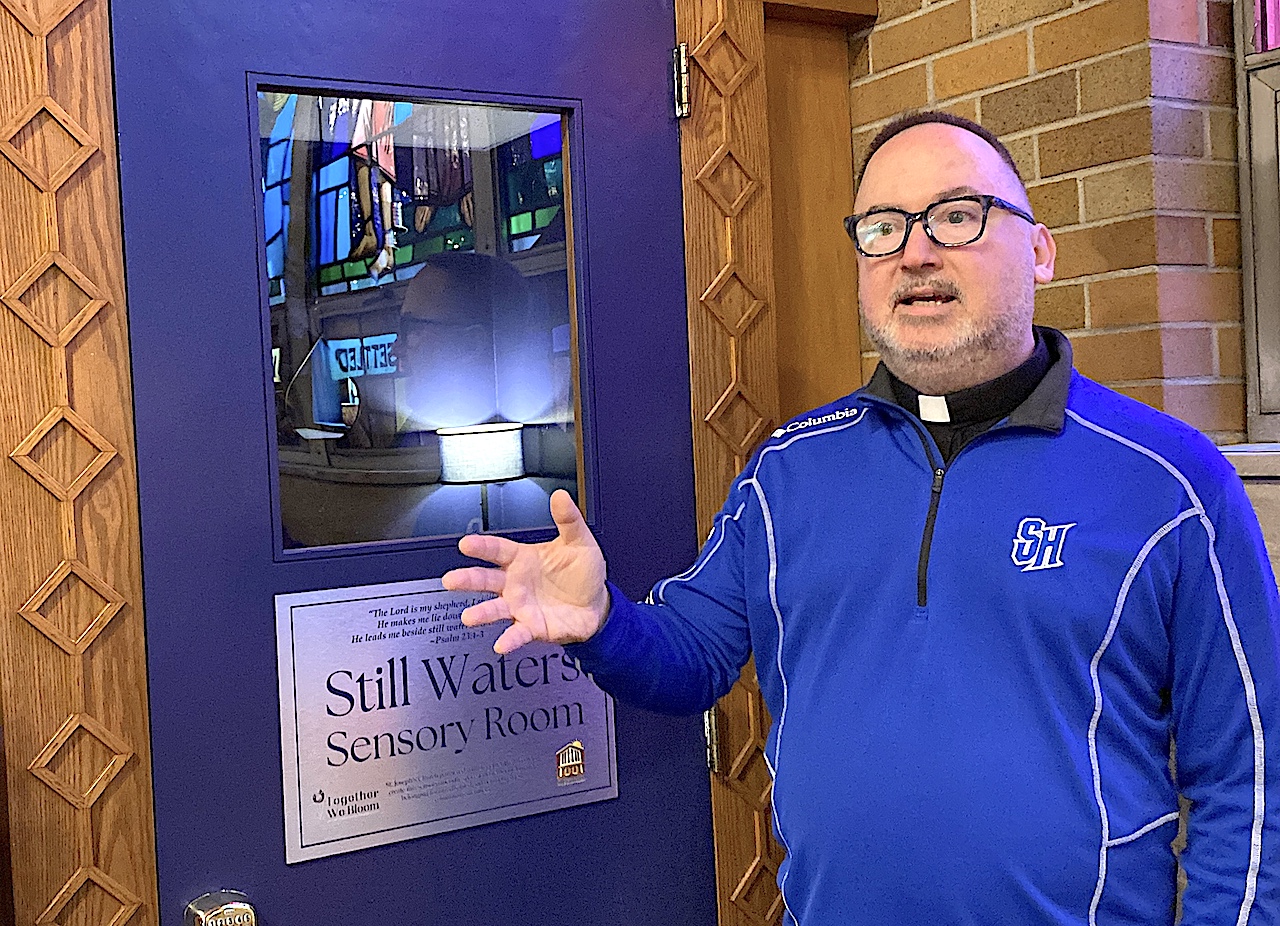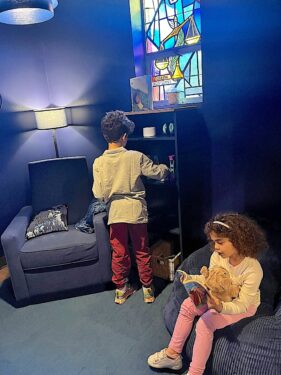
MAPLEWOOD, N.J. — In the Gospel, Jesus told his disciples to stop preventing children from approaching him. “Let the children come to me,” he said, and added, “for the kingdom of God belongs to such as these(Mark 10:13-14).”
Father Jim Worth, pastor of St. Joseph Parish in Maplewood, N.J., takes that scripture seriously. So did parishioners who joined him to ensure accessibility for all children, especially those with disabilities.
To that end, Father Worth and the parishioners converted a former confessional-turned-storage space in the back of the church into the Still Waters Sensory Room.
Here, children with neurodivergent disabilities, like autism or ADHD, can spend a few moments during Mass if they ever feel a sensory overload.
The room is painted a calming dark blue. Amenities include a beanbag chair, a rocker, religious-themed storybooks, and “stim” toys that occupy a child’s mind and fingers.
Its name comes from Psalm 23:1-3, in which King David wrote, “The Lord is my shepherd; there is nothing I lack. In green pastures he makes me lie down; to still waters he leads me; he restores my soul.”
But it’s not just for little kids.
Percy Losardo, 14, has autism. He struggled to sit still in the pews, so he stayed home while the rest of his family went to Mass. That changed when the parish opened the Still Waters Sensory Room on Dec. 8.
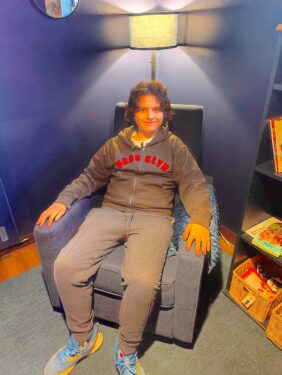
“I like that I can go to the room, and it’s quiet,” Percy said. “I can relax and take a break. I don’t have to leave church.”
Father Worth, now in his 10th year as pastor, has led the parish in other endeavors aimed at achieving inclusivity, including a basketball program for people with autism.
He recalled how last year, parishioner Kim Takacs, a speech-language pathologist, invited him to a community Zoom meeting to discuss how to improve accessibility for all.
Takacs is the founder and executive director of the Maplewood-based organization, Together We Bloom. During the Zoom call, Takacs described how sensory rooms were helping disabled communities.
Father Worth said he immediately thought of the packed storage space and offered it for a sensory room. Next, he met with Takacs and the Together We Bloom board to plan the renovation. The expense, he noted, was minimal.
“Some people volunteered,” he said. “It was very grassroots. I actually got dirty getting rid of all the stuff that had piled into this room.”
Together, We Bloom helps children with disabilities and their families achieve “equitable access through connection, community, and communication,” Takacs said.
“The way that we do that,” she said, “is by making the community more accessible, more accepting, and more appreciative of the diversity that disability and neurodivergence brings to our communities.”
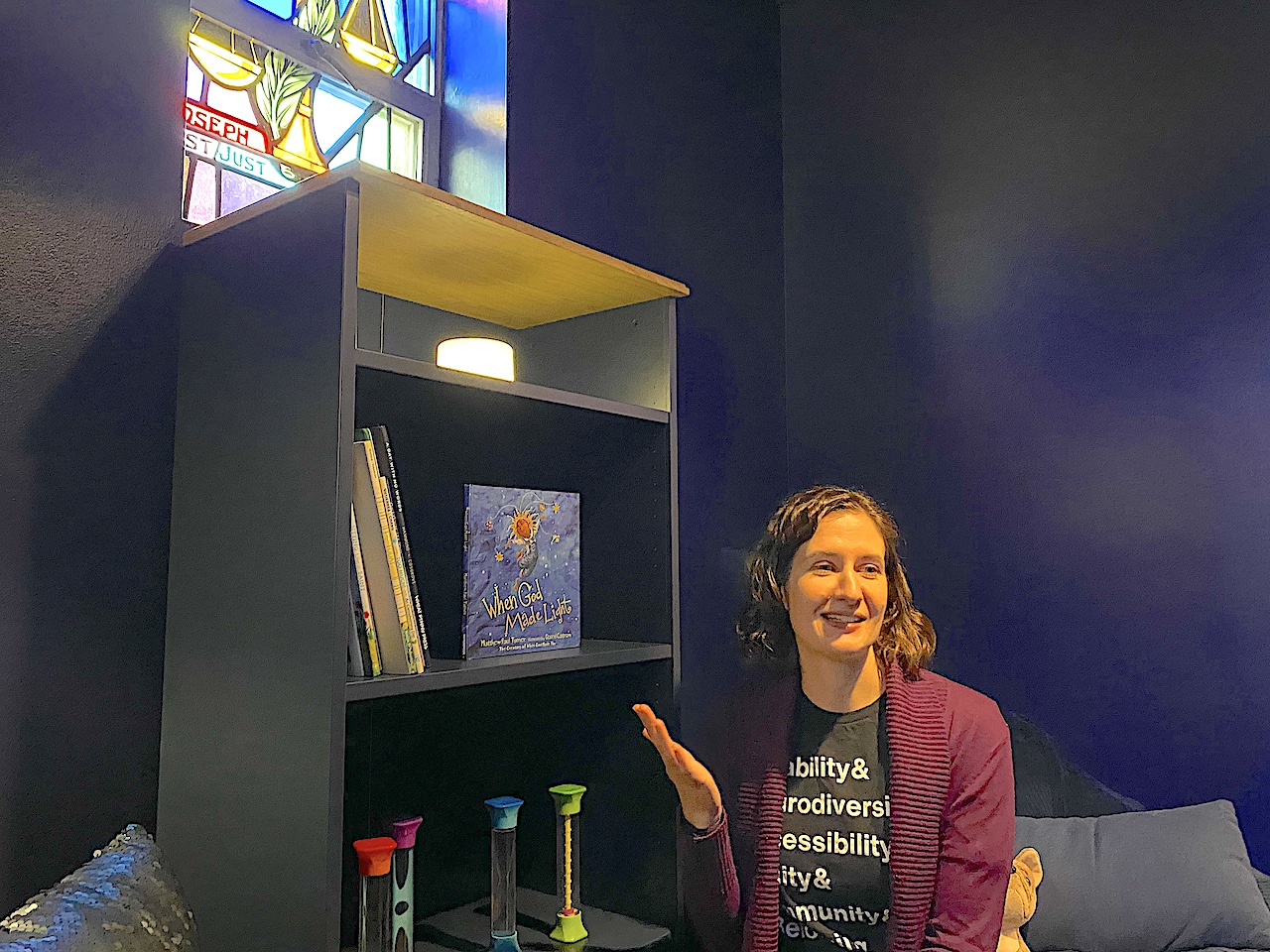
Neurodivergent refers to people whose brains process information differently than what is considered typical or “neurotypical.”
Takacs explained that her work with disabled people is “very much based on a call to social justice.” The nonprofit’s work is focused on “disability justice,” she said.
“It’s Catholic social teaching — this idea that we all belong,” Takacs said. “And all of our well-being, all of our sense of belonging, is very much tied to everybody feeling welcome and joining in solidarity and the common good.”
Takacs said the sensory room was expertly designed by Janelle Gera, the chair of the board for Together We Bloom, who has autism and ADHD. Takacs also praised the pastor.
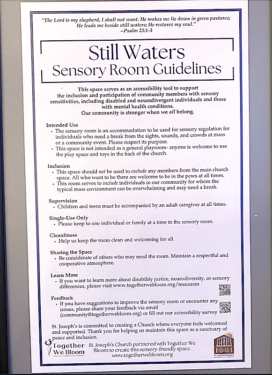
“It takes work to actively dismantle barriers, to make a place truly welcoming, and to really foster belonging,” Takacs said. “That’s what Father Jim has done by creating this space and all of the other things.”
For example, just outside Still Waters Sensory Room is a play center — the kind that usually appears in the nursery or a Sunday school classroom. Father Worth said the play area for “neurotypical” children shows that all are indeed welcome on Sunday.
“If you come to a 9 o’clock Mass, you hear kids all the time,” Father Worth said. “And it makes me happy because Mark’s Gospel says, ‘Let the children come to me.’ I’d rather them be here than in a crying room.”
Meanwhile, Father Worth said that the sensory room “lets a parent feel good about bringing their children to Mass.”
“I’ve had mothers come up to me with tears in their eyes saying, ‘You know what? Now I can come back to Mass.’ ”
Among the grateful parents is Pavitra Makam. She and her husband, Antony, used to bring their young children — son Kai, 9, and daughter Rumi, 5 — in shifts to Mass.
Their son has anxiety and ADHD, while their daughter has a rare genetic disorder that makes sitting uncomfortable in the wooden pews, she said.
Makam said Kai tends to “mask” his anxieties to get through the day, so he faces them in silence. But the sensory room, she added, gives him an outlet to manage stress.
“He gets very stressed and antsy,” she said. “So now he can come into the room, use the fidget toys, calm himself, reset, and then go back to Mass.”
Makam said belonging to St. Joseph Parish has been an “amazing experience.”
“They are so inclusive here,” she said. “And it feels so nice to be able to come and worship together and not have to separate our family.”
